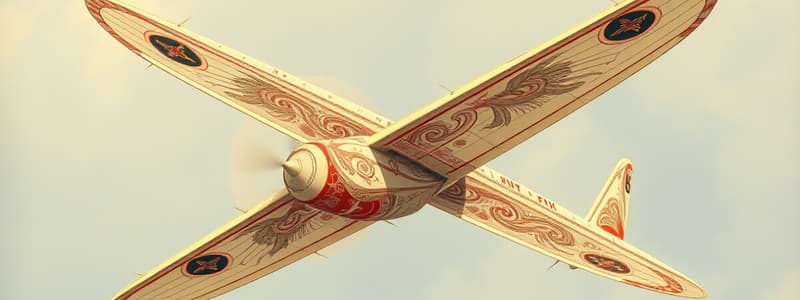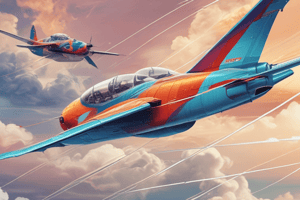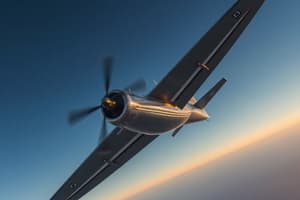Podcast
Questions and Answers
What are the four forces acting on an airplane in flight?
What are the four forces acting on an airplane in flight?
- Lift, Weight, Thrust, and Drag (correct)
- Gravity, Thrust
- Lift, Drag
- Thrust, Weight
The four forces that act on an airplane are in equilibrium during unaccelerated flight.
The four forces that act on an airplane are in equilibrium during unaccelerated flight.
True (A)
What is the angle A in figure 1 referred to?
What is the angle A in figure 1 referred to?
Angle of attack
What is the angle of attack?
What is the angle of attack?
What is the relationship of lift, drag, thrust, and weight when the airplane is in straight-and-level flight?
What is the relationship of lift, drag, thrust, and weight when the airplane is in straight-and-level flight?
One of the main functions of flaps during approach and landing is to:
One of the main functions of flaps during approach and landing is to:
What is the purpose of wing flaps?
What is the purpose of wing flaps?
The angle of attack at which an airplane wing stalls changes based on gross weight.
The angle of attack at which an airplane wing stalls changes based on gross weight.
What is Ground Effect?
What is Ground Effect?
When is floating caused by ground effect most realized during an approach to land?
When is floating caused by ground effect most realized during an approach to land?
What must a pilot be aware of as a result of ground effect?
What must a pilot be aware of as a result of ground effect?
What problem can ground effect cause?
What problem can ground effect cause?
Which statement relates to Bernoulli's principle?
Which statement relates to Bernoulli's principle?
What is the angle between the chord line of an airfoil and the relative wind known as?
What is the angle between the chord line of an airfoil and the relative wind known as?
How do changes in the center of pressure of a wing affect the aircraft's?
How do changes in the center of pressure of a wing affect the aircraft's?
What does an inherently stable airplane require?
What does an inherently stable airplane require?
What determines the longitudinal stability of an airplane?
What determines the longitudinal stability of an airplane?
What causes an airplane (except T-tail) to pitch nose-down when power is reduced?
What causes an airplane (except T-tail) to pitch nose-down when power is reduced?
What undesirable flight characteristic may occur if an airplane's CG is located aft of the aft CG limit?
What undesirable flight characteristic may occur if an airplane's CG is located aft of the aft CG limit?
What effect does loading an airplane to the most aft CG have?
What effect does loading an airplane to the most aft CG have?
In what flight condition must an aircraft be placed to spin?
In what flight condition must an aircraft be placed to spin?
During a spin to the left, which wing(s) is/are stalled?
During a spin to the left, which wing(s) is/are stalled?
In what flight condition is torque effect the greatest in a single-engine airplane?
In what flight condition is torque effect the greatest in a single-engine airplane?
What causes the left turning tendency of an airplane due to P-factor?
What causes the left turning tendency of an airplane due to P-factor?
When does P-factor cause the airplane to yaw to the left?
When does P-factor cause the airplane to yaw to the left?
If an airplane weighs 2,300 lbs, what approximate weight would the airplane structure be required to support during a 60 degree banked turn?
If an airplane weighs 2,300 lbs, what approximate weight would the airplane structure be required to support during a 60 degree banked turn?
If an airplane weighs 3,300 lbs, what approximate weight would the airplane structure be required to support during a 30 degree banked turn?
If an airplane weighs 3,300 lbs, what approximate weight would the airplane structure be required to support during a 30 degree banked turn?
If an airplane weighs 4,500 lbs, what approximate weight would the airplane structure be required to support during a 45 degree banked turn?
If an airplane weighs 4,500 lbs, what approximate weight would the airplane structure be required to support during a 45 degree banked turn?
What does the amount of excess load imposed on the wing of an airplane depend on?
What does the amount of excess load imposed on the wing of an airplane depend on?
Which basic flight maneuver increases the load factor on an airplane compared to straight-and-level flight?
Which basic flight maneuver increases the load factor on an airplane compared to straight-and-level flight?
What force makes an airplane turn?
What force makes an airplane turn?
During an approach to a stall, an increased load factor will cause the airplane to:
During an approach to a stall, an increased load factor will cause the airplane to:
What are the four flight fundamentals involved in maneuvering an aircraft?
What are the four flight fundamentals involved in maneuvering an aircraft?
Flashcards are hidden until you start studying
Study Notes
Four Forces of Flight
- Lift, weight, thrust, and drag are the four forces acting on an airplane during flight.
- Forces achieve equilibrium in unaccelerated flight when lift equals weight and thrust equals drag.
Angle of Attack
- The angle of attack is the angle between the chord line of a wing and the relative wind.
- This angle remains constant regardless of the aircraft's gross weight.
Role of Wing Flaps
- Wing flaps increase the angle of descent without a corresponding increase in airspeed, allowing for steeper approaches.
- They enable pilots to land without gaining excessive speed.
Ground Effect
- Ground effect interferes with airflow patterns around an aircraft, particularly when close to the Earth's surface.
- Floating during landing is most pronounced when the aircraft is within one wingspan's length above the ground.
- Pilots must be cautious of induced drag reduction during ground effect, which can result in excessive floating.
Bernoulli's Principle
- According to Bernoulli's principle, faster airflow over a curved upper airfoil surface produces lower pressure above the wing.
Aircraft Stability
- The center of gravity (CG) location in relation to the center of lift determines longitudinal stability; an aft CG can destabilize the aircraft.
- Stability affects controllability; an inherently stable airplane requires less effort to control.
Spin Dynamics
- A stall is necessary for an airplane to enter a spin; in a left spin, both wings are stalled.
- The torque effect, most significant during low airspeed and high power, causes the airplane to pitch down when power is reduced, particularly in non-T-tail designs.
Load Factors and Banking Turns
- The required structural support increases during banked turns; example weights include 4,600 lbs during a 60-degree turn for a 2,300 lbs airplane.
- Airplane load can increase in turns compared to straight-and-level flight, with a higher load factor resulting in a higher stall speed during an approach to a stall.
Flight Maneuvers
- Essential flight fundamentals include straight-and-level flight, turns, climbs, and descents.
- The horizontal component of lift is the force responsible for turning an airplane.
Studying That Suits You
Use AI to generate personalized quizzes and flashcards to suit your learning preferences.




